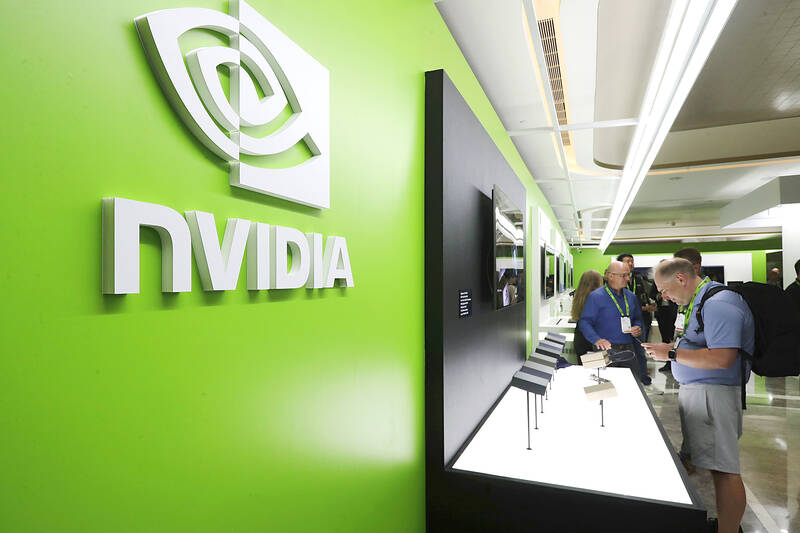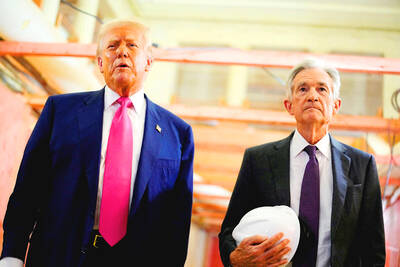Even as Nvidia on Wednesday reported another blockbuster quarter of 69 percent sales growth, the artificial intelligence (AI) chip designer warned of more risks to its business emerging in the technology conflict between the US and China.
Tucked into Nvidia’s quarterly filing with US securities regulators, the company for the first time said that restrictions on the use of open-source AI models from China, such as DeepSeek and Qwen, could hurt its business, as could US rules barring connected vehicle technology from China, where Nvidia’s long-struggling auto chip business has finally flourished.
While Nvidia CEO Jensen Huang (黃仁勳) on a conference call with analysts praised US President Donald Trump’s decision to rescind an export rule put in place by former US president Joe Biden that would have regulated the flow of Nvidia’s chips around the world, the company’s quarterly filing showed that no new rule had been issued in its place and that a “replacement rule may impose new restrictions on our products or operations.”

Photo: Chiang Ying-ying, AP
On the other hand, Huang criticized new export curbs imposed by the Trump administration last month. The curbs stop the company from selling its H20 chip made for the Chinese market, which Huang called “a springboard to global success.”
The export limits cost Nvidia US$2.5 billion in sales during its first quarter, and it expects another US$8 billion sales hit in the second quarter.
Sales of the H20 in China earned Nvidia US$4.6 billion in revenue, as customers stockpiled the chips before the curbs set in. The China business accounted for 12.5 percent of overall revenue.
“The question is not whether China will have AI — it already does. The question is whether one of the world’s largest AI markets will run on American platforms,” Huang said, later adding that “AI export controls should strengthen US platforms, not drive half of the world’s AI talent to rivals.”
Huang also said that keeping Chinese open-source models such as DeepSeek and Qwen running on Nvidia chips provides US firms with valuable insight on where the global AI industry is headed.
“US platforms must remain the preferred platform for open-source AI,” he said. “That means supporting collaboration with top developers globally, including in China. America wins when models like DeepSeek and Qwen run best on American infrastructure.”
Despite the curbs, Nvidia forecast second-quarter sales of US$45 billion, plus or minus 2 percent, in the second quarter, only slightly below analysts’ average estimate of US$45.9 billion, data compiled by LSEG showed. That implied growth of about 50 percent from a year earlier.
Executives also highlighted deals worth potentially billions of dollars in the coming months and years in Saudi Arabia, the United Arab Emirates and Taiwan, sending Nvidia shares up after hours and leading analysts to conclude the impact of US-China trade tensions was not as bad as feared.
“Rather than downplay the China hit, [Huang] contextualized it as a known, manageable speed bump in an otherwise hyper-accelerated growth narrative,” Running Point Capital chief investment officer Michael Ashley Schulman said.

IN THE AIR: While most companies said they were committed to North American operations, some added that production and costs would depend on the outcome of a US trade probe Leading local contract electronics makers Wistron Corp (緯創), Quanta Computer Inc (廣達), Inventec Corp (英業達) and Compal Electronics Inc (仁寶) are to maintain their North American expansion plans, despite Washington’s 20 percent tariff on Taiwanese goods. Wistron said it has long maintained a presence in the US, while distributing production across Taiwan, North America, Southeast Asia and Europe. The company is in talks with customers to align capacity with their site preferences, a company official told the Taipei Times by telephone on Friday. The company is still in talks with clients over who would bear the tariff costs, with the outcome pending further

NEGOTIATIONS: Semiconductors play an outsized role in Taiwan’s industrial and economic development and are a major driver of the Taiwan-US trade imbalance With US President Donald Trump threatening to impose tariffs on semiconductors, Taiwan is expected to face a significant challenge, as information and communications technology (ICT) products account for more than 70 percent of its exports to the US, Chung-Hua Institution for Economic Research (CIER, 中華經濟研究院) president Lien Hsien-ming (連賢明) said on Friday. Compared with other countries, semiconductors play a disproportionately large role in Taiwan’s industrial and economic development, Lien said. As the sixth-largest contributor to the US trade deficit, Taiwan recorded a US$73.9 billion trade surplus with the US last year — up from US$47.8 billion in 2023 — driven by strong

AI: Softbank’s stake increases in Nvidia and TSMC reflect Masayoshi Son’s effort to gain a foothold in key nodes of the AI value chain, from chip design to data infrastructure Softbank Group Corp is building up stakes in Nvidia Corp and Taiwan Semiconductor Manufacturing Co (TSMC, 台積電), the latest reflection of founder Masayoshi Son’s focus on the tools and hardware underpinning artificial intelligence (AI). The Japanese technology investor raised its stake in Nvidia to about US$3 billion by the end of March, up from US$1 billion in the prior quarter, regulatory filings showed. It bought about US$330 million worth of TSMC shares and US$170 million in Oracle Corp, they showed. Softbank’s signature Vision Fund has also monetized almost US$2 billion of public and private assets in the first half of this year,

POWELL SUCCESSOR: US Fed Governor Adriana Kugler’s resignation gives Donald Trump an opening on the board, potentially accelerating his decision on the next chair US President Donald Trump suddenly has a chance to fill an opening at the US Federal Reserve earlier than expected, after Fed Governor Adriana Kugler announced her resignation on Friday. It might also force him to pick the next Fed chair months sooner than he had anticipated. “The ball is now in Trump’s court,” LH Meyer/Monetary Policy Analytics Inc economist Derek Tang said. “Trump is the one who’s been putting pressure on the Fed to do this and that, and Trump says he wants to have his own people on. So now he has the opportunity.” Kugler’s exit unfolds amid unprecedented public pressure